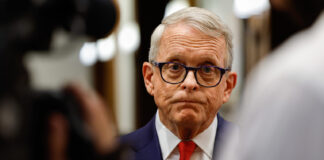
Gov. Gretchen Whitmer of Michigan signed an executive order on Friday that abolishes the Medical Marijuana Licensing Board and creates a single state agency to regulate both medical and recreational cannabis. Whitmer’s order, which is scheduled to go into effect on April 30, establishes the Marijuana Regulatory Agency as a part of the Michigan Department of Licensing and Regulatory Affairs (LARA). The governor said in a statement on Friday that the move will streamline the issuing of licenses for cannabis growers, processors, and dispensaries.
“This executive order will eliminate inefficiencies that have made it difficult to meet the needs of Michigan’s medical marijuana patients,” Whitmer said. “All elements of this agency have been designed to serve and better protect Michigan residents, and I’m eager to have a unified effort across state departments to make sure this process runs effectively and efficiently.”
Whitmer said that combining the board with the regulatory structure for recreational cannabis, which was legalized by Michigan voters last November, would end delays in licensing from the board.
“To avoid licensing delays and to better coordinate varying sources of authority for the enforcement of state law, the administration of state laws relating to marijuana can more effectively and efficiently be administered by a dedicated state agency,” she said in her executive order.
Board Slow to Issue Licenses
Since the board began reviewing applications last July, it has approved only 121 licenses. Of those, 31 growers, 11 processors, five transporters, four testing facilities, and 54 dispensaries have paid their license fees and begun operations. Shelly Edgerton, the former director of LARA who now works as an attorney and registered lobbyist, said the executive order was a “step in the right direction” for the regulation of the state’s cannabis industry.
“The volunteer Board took on a monumental lift to get this program going, but in the short time frame the program has been running, we have not seen the expected volume of licensees entering the market,” Edgerton said. “With this executive order, the licensing process will be more efficient and allow more applicants into the space.”
Don Bailey, a member of the licensing board and a former narcotics officer with the Michigan State Police, said that Whitmer’s order is the result of lobbying by the cannabis industry.
“There’s been such pressure applied by the marijuana lobby to rush to get some of these applications approved, there’s been a lack of investigation into what’s been going on behind the scenes, who’s really applying, are they bad actors or not,” said Bailey.
Bailey was especially tough on applicants, particularly those who had served as registered caregivers for medical cannabis patients, believing that many had illegally profited from the up to 72 plants they were permitted to grow for up to five medical marijuana cardholders. Bailey said that the information being collected for cannabis business licenses is not being verified. In one instance, he said, an applicant submitted a photograph of $100,000 in cash in lieu of a financial statement from a bank.
“Data collection without data analysis is nothing, and that’s where we’re at,” said Bailey.
Josh Hovey, a spokesman for the Michigan Cannabis Industry Association, said that abolishing the licensing board should improve the situation for the state’s medical marijuana patients.
“The challenges and the delays in getting the medical marijuana system up and running have been numerous and have been primarily because of inconsistency from the board,” he said.
Hovey said that the board is “an unnecessary layer of government that has been a hindrance to getting a successful legal, regulated market up and running.”
Michigan’s state legislature has the power to veto Whitmer’s executive order, although that appears unlikely. Before issuing the order, the governor consulted with leaders of the House and Senate and informed them of her plans. Senate Majority Leader Mike Shirkey said he “appreciates the governor’s willingness to discuss the issue” and his indicated his support for the changes.











